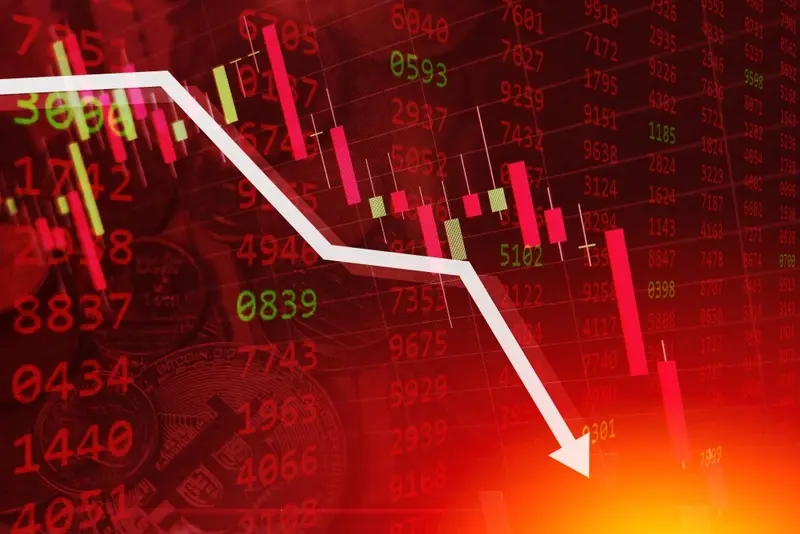
Market sentiment slumped on Thursday, sending blue chip European benchmarks sharply lower, as investors brace for rising interest rates to stall economic growth.
The FTSE 100 index closed down 123.80 points, or 1.8%, at 6,881.59 Thursday - sinking to levels not seen since April 2021.
The mid-cap FTSE 250 index ended down 530.57 points, or 3.1%, at 16,790.40. The AIM All-Share index closed down 15.59 points, or 1.9%, at 798.39.
The Cboe UK 100 index closed down 1.9% at 685.39. The Cboe 250 ended down 3.0%, at 14,370.97, and the Cboe Small Companies closed down 0.9% at 12,580.97.
The CAC 40 stock index in Paris and the DAX 40 in Frankfurt were both 1.3% lower.
Sterling continued its rebound a day after the Bank of England's emergency intervention in bond markets.
The pound fetched $1.1033 late Thursday, firm from $1.0763 at the London equities close on Wednesday.
The euro rose to $0.9781 from $0.9645.
German inflation is expected to reach 10% in September, the latest flash estimate from the German Federal Statistical Office said.
In August, the consumer price index stood at 7.9%. In July, it was 7.5%.
The harmonised index of consumer prices - which allows for EU-wide comparison - is expected to reach 10.9%, however, an increase of 2.2% against the previous month.
In London, Next shares slid 12%, among the worst large-cap performers.
The clothing and homewares retailer lowered its annual guidance as it believes that the tough trading it experienced in August and cost-of-living pressures will offset any boost from recent UK government stimulus measures.
Full price sales advanced 12% year-on-year in the first half ended July 30, though the company now expects a decline for the second half. Full price sales are to shrink by 1.5% year-on-year. It had previously guided for 1% growth.
Next also lowered bottom-line guidance. It now expects annual pretax profit of £840 million, down from the previous £860 million guidance, but up 2.1% on last year.
In the midcaps, Synthomer was anchored to the bottom of the index, losing 48%, as it lowered guidance.
The Essex-based chemicals maker expects its 2022 earnings before interest, tax, depreciation and amortisation to be 10% to 15% below previous expectations. Synthomer put this down to weaker macro conditions hitting its European business.
Mitchells & Butlers dropped 15% but fourth-quarter sales topped pre-virus levels, despite the pub and bar owner facing extreme hot weather in the UK and rail strikes.
The Birmingham-based operator of pubs, bars and restaurants said in the quarter ended September 24, total sales rose 1.5% from three years earlier, before the onset of the Covid-19 pandemic.
‘Like-for-like sales improved in the fourth quarter, despite the ongoing impact of extreme heat as well as further rail strikes, both of which disrupted trade. Sales over the August bank holiday were encouraging, with like-for-like growth over the three-day weekend of over 6%, before returning to levels consistent with the quarter as a whole,’ Mitchells & Butlers said.
For the full-year, sales were up 1.1% on pre-virus levels. The company reported revenue of £1.07 billion in financial 2021, down from £1.48 billion the year before. In financial 2019 it booked revenue of £2.24 billion.
Against the yen, the dollar inched higher to JP¥144.48 from JP¥144.41.
In New York, stocks were painted red. The Dow Jones Industrial Average was down 1.6%, the S&P 500 down 2.2% and the Nasdaq Composite was 3.0% lower.
The contraction of economic growth in the US during the second quarter has remained unchanged, according to the third estimate from the Department of Commerce on Thursday.
The US economy contracted by 0.6% annually in the second quarter, following a 1.6% decline in the first quarter. It remains in a technical recession.
In a second estimate in late August, the figure had been revised down from the first estimate of a 0.9% contraction.
Capital Economics said the world's largest economy is on course for a ‘mild’ recession.
‘While we expect a modest rebound in economic growth in the second half, the combination of persistently high inflation, more aggressive Fed monetary policy tightening, negative spill over effects from slower global activity and weaker corporate earnings will push the US economy into a mild recession in the first half of 2023. We expect the economy to show no growth in 2023 after advancing 1.7% in 2022. Rising financial market turbulence is increasing downside risks to our outlook,’ it said.
Also on Thursday, unemployment fell unexpectedly in the week ending September 24, according to the US Department of Labor.
Initial jobless claims totalled 193,00 during the week, down 16,000 from the revised figure of 209,000 for the week before. This figure came in well below FXStreet-cited consensus, with expectations of claims ticking up to 215,000.
Gold traded at $1,658.20 an ounce Thursday evening in London, up from $1,653.20 late Wednesday. Brent oil rose to $88.71 a barrel from $88.17.
In the international economic events calendar on Friday, there is Japanese industrial production and employment alongside Chinese manufacturing PMI figures overnight.
In the morning, there is UK GDP numbers along with the Nationwide house price index at 0700 BST. In Germany, there is unemployment numbers at 0855 BST, followed by EU inflation and unemployment at 1000 BST.
In a very busy local corporate calendar, there is interim results from Cineworld, DP Eurasia, Dignity and Iofina among others. Pennon will issue a trading statement.
Copyright 2022 Alliance News Limited. All Rights Reserved.




